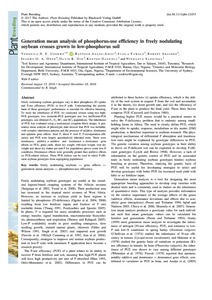Freely nodulating soybean genotypes vary in their phosphorus (P) uptake and P-use efficiency (PUE) in low-P soils. Understanding the genetic basis of these genotypes’ performance is essential for effective breeding. To study the inheritance of PUE, we conducted crosses using two high-PUE genotypes, two moderate-PUE genotypes and two inefficient-PUE genotypes, and obtained F1, F2, BC1 and BC2 populations. The inheritance of PUE was evaluated using a randomized complete block design. A generation mean analysis of phenotypic data showed that PUE was heritable, with complex inheritance patterns and the presence of additive, dominance and epistatic gene effects. Seed P, shoot P, root P, P-incorporation efficiency and PUE were largely quantitatively inherited traits. There were dominance, additive × additive and dominance × dominance gene effects on PUE, grain yield, shoot dry weight, 100-seed weight, root dry weight and shoot dry matter per unit P for populations grown under low-P conditions. Dominance effects were generally greater than additive effects on PUE-related indices. These PUE indices can be used to select P-efficient soybean genotypes from segregating populations.
Authors and Publishers
Uzokwe, V.N.E.
Asafo-Adjei, B.
Fawole, B.
Abaidoo, R.
Odeh, I.
Ojo, D.K.
Dashiell, K.
Sanginga, N.
Bells University
The International Institute of Tropical Agriculture (IITA) is a non-profit institution that generates agricultural innovations to meet Africa’s most pressing challenges of hunger, malnutrition, poverty, and natural resource degradation. Working with various partners across sub-Saharan Africa, we improve livelihoods, enhance food and nutrition security, increase employment, and preserve natural resource integrity.
Shaping change and improving lives from the start
Our founding principle as Australia’s first university was that we would be a modern and progressive institution. It’s an ideal we still hold dear today.
When William Charles Wentworth proposed the idea of Australia’s first university in 1850, he imagined “the opportunity for the child of every class to become great and useful in the destinies of this country”.
Data provider
CGIAR (CGIAR)
CGIAR is the only worldwide partnership addressing agricultural research for development, whose work contributes to the global effort to tackle poverty, hunger and major nutrition imbalances, and environmental degradation.




